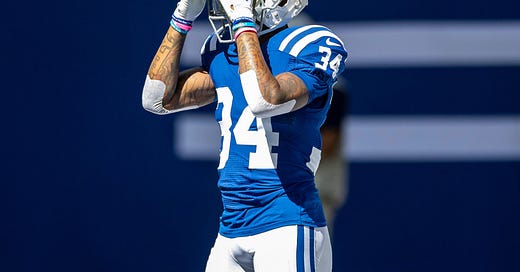Rodgers in limbo as NFL lifts betting suspensions
NFL reinstatements, Missouri petition, South Africa opposition bill, Star ****ups, Ombudsman delay +More
The NFL has reinstated five players but Isaiah Rodgers isn’t one of them.
In +More: DraftKings RG hire, Brazilian payments ordinance.
The Missouri sports-betting petition hits its numbers.
South Africa’s main opposition party introduces a remote gambling bill.
More revelations from the enquiry into New South Wales’ Star casino.
The UK waits on an ombudsman… and waits.
Out of luck, falling through the cracks.
NFL lifts suspensions
Bucked Rodgers: The NFL has reinstated five players suspended for gambling violations, but Philadelphia Eagles star Isaiah Rodgers isn’t one of them. The former Indianapolis Colts cornerback was frozen out by the league for the 2023-24 season after it emerged he had placed hundreds of bets on sports, including at least one on his own team.
After being let go by the Colts, Rodgers was picked up by the Eagles and recently applied for reinstatement, but the league hasn’t shifted its position.
The five others banned for the whole season have had their suspensions lifted, but all are without roster spots.
Former Washington Commanders defensive end Shaka Toney was released by his team, as was Colts defensive end Rashod Berry and Detroit Lions wide receiver Quintez Cephus, defensive tackle Demetrius Taylor and safety CJ Moore.
Odd men out: Rodgers and current Jaguars wide receiver Calvin Ridley are the only players accused of wagering on their own teams since legalized sports betting opened up in 2018. Their suspensions have been the heaviest of all, with Ridley out for over a year and Rodgers approaching a similar timeframe.
Other players copped shorter bans for gambling on team facilities or on road trips, which is prohibited.
Don’t hate the playa: The NFL made the announcement a day after basketball bosses banned former Toronto Raptors center Jontay Porter for life, amid growing concern in the US about the extent to which players are getting sucked into sports betting.
Porter placed at least 13 bets on NBA games using an associate’s online betting account, the NBA said in a statement.
He also allegedly wagered millions through a FanDuel VIP account, with his actions deemed to be more egregious than Rodgers’.
Porter placed a multi-game parlay that included his own team to lose in a game he did not play in.
The NFL did not accuse Rodgers of placing wagers against his own team.
GuardDog, powered by Underdog, is a pioneering investment fund dedicated to fostering innovation in responsible gaming.
GuardDog supports and accelerates early-stage startups focused on building new and creative solutions to address problem gaming and further responsible gaming.
Ready to be one of the underdogs of responsible gaming?
Visit to apply: https://underdogfantasy.com/guarddog
+More
DraftKings has appointed Lori Kalani as the company’s first chief responsible gaming officer. She joins from the law firm Cozen O’Connor, where she co-chaired the State Attorneys General practice, and has extensive experience in consumer protection law in diverse industries including gaming, social media, telecommunications, hospitality and healthcare.
Jason Robins, CEO, said responsible gaming is one of the company’s top priorities and that in this new role, Kalani would advance DraftKings’ RG initiatives.
The company said its approach was “systems-based” and utilized technology, employee training, evidence-based research, collaboration with third parties and advocacy groups, and “comprehensive player education” to promote responsible play across all platforms.
The Brazilian Payments Ordinance providing for the regulations around payments for the new regulated betting and gaming regime has been published. The rules determine that deposits, withdrawals and prize payments can only be made through electronic transfer, which includes Pix, and debit and prepaid cards related to bank accounts authorized by the Central Bank.
Separately, the government has appointed Regis Dudena as leader of the Prizes and Betting Secretariat. Dudena is the head of legislative and regulatory advocacy for a law firm in the country.
The International Tennis Integrity Agency (ITIA) has banned a Bulgarian official for life after he admitted multiple corruption charges. Pavel Atanasov, a national-level official, was found guilty of 21 breaches between 2019 and 2023. They included manipulation of scoring data of matches for betting purposes, facilitating wagering and betting on tennis, failing to report corruption and other charges.
The share of revenue at Kindred from high-risk players increased sequentially to 3.2% in Q1. The company continues to focus on detection and automated interventions, with improved behavior following 87.1% of interventions.
In Ukraine, President Volodymyr Zelensky has signed a decree that bans anyone in the military from gambling online until the end of martial law.
What we’re reading
Through a glass darkly: In the latest gambling scandal, some see a glimpse of sports’ future. In The New York Times.
Helping with enquiries: The Nevada Gaming Board has joined the ongoing probe into the activities of former casino exec Scott Sibella, according to sources who have spoken to the Nevada Current.
Missouri petition hits its target
Magic number: A lobby group has claimed it has enough signatures to get sports betting on the ballot in Missouri this November. Winning for Missouri Education announced on Wednesday it has around 325,000 signatures in support of legalization.
“The tremendous support we’ve seen throughout the state is a testament to Missourians’ readiness to bring sport-betting revenue home and support our local schools, students and teachers in the process,” said Winning for Missouri Education spokesperson Jack Cardetti.
“As the campaign approaches our goal of putting this on the November ballot, Missouri is a step closer to allowing Missouri adults to bet on sports, while generating tens of millions in annual funding for our classrooms.”
Around 171,000 valid signatures are required by the Missouri secretary of state by May 5.
Show me the money: Polls earlier in the year conducted by YouGov and Boston’s Emerson College found broad support for the initiative in the Show-Me State. Missourians would vote on legal sports betting to be regulated by the Missouri Gaming Commission, with a 10% tax on revenue.
The chair of the MGC, Jan Zimmerman, believed regulations would be in place within months, if the ballot were to pass.
“We are, from a regulation standpoint, an oversight standpoint, we’re ready to hit the ground running,” he said.
Alabama in committee
Alabama pines: With the fate of two bills now in the hands of a bipartisan conference committee in the Alabama legislature, the state’s attorney has said he doesn’t want to see gambling legalized.
Truth or consequences: A committee of members from both the House and Senate will negotiate a gambling legislative package this week, where they will weigh up approval of various measures, including a lottery, new casinos and sportsbooks.
However, the state’s chief law enforcement officer isn’t a fan. “I think the fact that you can raise penalties for misdemeanors to felonies is long since overdue,” Alabama attorney general Steve Marshall told local media.
“That’s one of the reasons why you’ve seen individuals take steps to open illegal operations because they don’t feel like there are consequences. Do I believe that we need a statewide gambling commission and a separate branch of law enforcement to do it? No.”
When asked if he would support either the Senate or House versions of the gaming bills, Marshall said: “No, absolutely not. I would’ve voted against both of them.”
Vice versa: Alabama is one of the few remaining states where gambling is entirely prohibited. Early support for the measures ran into conservative and religious opposition of gambling in any form, including a state-run lottery. To pass and go to the voting public, the bills require three-fifths support in both the House and Senate.
The 2024 legislative session concludes in May.
South Africa proposals
Howzit: A remote gambling bill has been introduced into parliament by the main opposition party, which includes proposals for a new licensing regime and regulatory framework as well as a set of responsible gaming measures.
The bill proposes a regional system of licensing rather than under the auspices of the National Gambling Board.
The provincial authorities will also be responsible for supervising and enforcing compliance.
The bill proposes three license types for remote gambling operators, online suppliers and a remote gambling employment license.
Gambling advertising on radio and TV would be limited to appearing between 8pm and 6am and avoiding programming where the audience is expected to be under 18.
Good things come: The bill has been two years in the making and was introduced by the Democratic Alliance MP Dean Macpherson, with an eye on moving towards regulation should his party win the upcoming national and provincial elections and replace the ruling ANC.
It’s about time: In its press release announcing the bill, the DA noted the National Gambling Amendment Act, which was designed to regulate online gambling, was given presidential assent 16 years ago but it has still not been brought into operation,
“The ANC government has shown, over these 16 years, that it has no intention of protecting players and the industry from criminal elements,” the statement added.
“The DA has therefore taken it upon itself to ensure adequate protection by means of introducing this private member’s bill.
White Paper worries?
Department of Trust is the industry’s go-to platform for end-to-end frictionless and enhanced financial risk assessments anticipated by the White Paper.
Join Rank Group plc and other leading operators in getting a head start on the coming era of additional checks from the sector experts.
Book your demo today at https://dotrust.co.uk
Offices in London and Gibraltar. FCA, ICO registered. ISO27001 certified.
Star sinker
A new low: Sydney’s troubled Star casino inadvertently gave away millions of dollars in cash to dozens of people following an apparent software glitch, and then reported the recipients for fraud. It took two weeks for the bug to be identified and fixed, by which time more than A$3m ($2m) had been extracted from the malfunctioning ‘ticket in cash out’ (TICO) machines.
The ATM-style devices allow gamblers to convert their winnings into cash by reading a barcode on a slot machine receipt.
Although customers can usually insert two receipts into the TICO machines simultaneously, the glitch meant the devices returned one ticket that could be re-used.
That the TICOs can only dispense up to A$2,000 in cash at once to prevent money laundering is believed to have saved the casino from losing even more.
Police later charged more than 40 recipients with fraud and other offenses. The list of people who bilked the machines included run-of-the-mill scammers, gambling addicts and homeless people who had gotten wind of the bug.
Fools paradise: According to the The Sydney Morning Herald, details emerged during an independent inquiry into the casino’s operations, as it battles to save its skin following years of mismanagement.
In his testimony to the New South Wales Independent Casino Commission, casino manager Nicholas Weeks blamed the faulty software as “small additional amounts” were erroneously dispensed at first, before “very large amounts of cash” were spat out due to the defect.
By the time the casino noticed the problem, it was more than A$3m down.
The casino remains at risk of being defrauded due to its poor controls, Weeks admitted.
Crown suitability
Separately, the New South Wales Independent Casino Commission has announced that Crown Sydney has been found suitable to retain its casino license after undergoing extensive changes to its practices in the areas of gambling-harm minimisation, financial crime prevention, compliance and culture.
Mark McWhinnie, Crown Sydney CEO, said the NICC’s decision “recognises the genuine and sustainable changes we’ve made and our ongoing commitment to operating at the highest industry standards.”
The ombudsman delay
12 months and counting: It is now a year since the publication of the Gambling Act Review White Paper and one of its recommendations was the establishment of a gambling ombudsman, “to be established within a year, with the process for appointing it to begin in summer 2023”. So, how’s it going?
Not a peep: The Betting and Gaming Council agreed to set up and fund the ombudsman and the BGC’s Wes Himes told the DCMS Select Committee on July 11 last year that “yes, we are on pace with our timetable, and the government have asked us to bring a forthcoming ombudsman by next summer.”
Since then, there has been no further comment on progress from the BGC and although it was invited to comment for this article it declined to do so.
DCMS, however, did respond, but merely repeated that the process to appoint an ombudsman began last summer and that “if the non-statutory approach doesn't deliver then we will look to step in and legislate.”
It does not put a timeline on how long the BGC has to produce an ombudsman, with the summer of 2024 for it taking complaints as stated in the White Paper obviously not being achieved.
So where is it then? In lieu of any updates from the parties involved, speculation as to what is causing the delays seems justified. The White Paper said the ombudsman would have to meet the membership requirements of the Ombudsman Association.
In its response to the White Paper, the OA offered a possible clue as to the cause of the delay.
“The goal for a new gambling ombudsman to be accepting complaints ‘within a year’ [summer 2024] is an ambitious one,” it said.
“Any lack of clarity over the ombudsman’s jurisdiction, in terms of the organizations or issues covered, or pushback against the OA’s criteria, could cause delay”.
Up periscope: It should be remembered that it was deemed a gambling ombudsman was needed because complaints involving social responsibility and affordability issues are outside of the scope of existing alternative dispute resolution services, such as IBAS.
Last year, IBAS refused to deal with 457 cases because they fell outside of its remit.
It would seem that those and subsequent complainants will have to wait even longer before there is a body that can deal with their complaints.
Calendar
May 6: Gaming in Spain
May 7: SBC Summit North America Player Protection Symposium
May 28-30: IAGA, Washington DC
June 6: Gaming in Holland
As more and more suppliers gravitate towards regulated markets to enhance their reputation, Compliable’s cutting-edge platform is able to service markets across North America, Europe and LatAm, helping providers to get licensed in the most streamlined way possible.
Swift application process – on average, it takes just 27 minutes to complete the onboarding journey
Key Licensing Module – decision makers can manage key licenses through a streamlined system
Unique Compliance Dashboard – apply across multiple regions and track applications from the outset
Find out more about Compliable’s licensing process here
An +More Media publication.
For sponsorship inquiries email scott@andmore.media.











